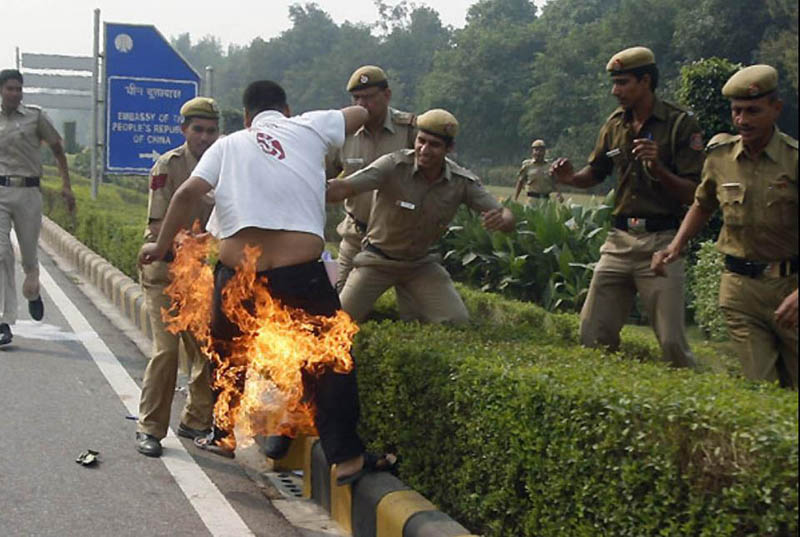 Wyoming, US: - Since His Holiness the Dalai Lama's statement on his decision to devolve political leadership of the Tibetan government-in-exile to a democratically elected leader, on 10 March 2011, a major question has been debated among Tibetans, Chinese, and supporters of Tibet: Will the Tibetan freedom movement enter a new phase?
Wyoming, US: - Since His Holiness the Dalai Lama's statement on his decision to devolve political leadership of the Tibetan government-in-exile to a democratically elected leader, on 10 March 2011, a major question has been debated among Tibetans, Chinese, and supporters of Tibet: Will the Tibetan freedom movement enter a new phase?Following recent events in Tibet and in exile, that question has been echoing much louder.
Firstly, Tibetans in Chinese-controlled Tibet have taken unprecedented non-violent action by self-immolating, to voice their anger against continued Chinese repression and restrictions on religious freedom.
So far, eleven Tibetans have self-immolated and six of them have died in doing so.
The newly elected Tibetan leadership-in-exile does not encourage self-immolations or protests inside Tibet. However, they have not issued any statement requesting Tibetans to halt the practice.
There have now also been two incidents of self-immolation by exile Tibetans in Kathmandu, Nepal.
Secondly, Tibetans living in exile have resorted to desperate acts to seek international attention about the self-immolations, including the recent stormings of the Chinese embassies in Vienna, Austria and Paris, France, during which the Chinese national flag was torn down.
What might these unprecedented actions mean to China as well as to Tibetans. What do these actions say to China? As repeatedly noted by experts on Tibet, they provide a clear message to the Chinese government that its policy of repression in Tibet is not succeeding in making Tibetans happy.
China must formulate new and more relaxed policies to meet the primary needs and aspirations of ethnic minorities in general, and of the Tibetan minority in particular.
The self-immolations within and outside Chinese-controlled Tibet may be a massive warning sign for China. Until now, the acts have remained non-violent. However, they also indicate the potential for violent activities from Tibetans who may be willing to sacrifice their lives.
Further, these acts indicate that the Tibetan freedom struggle will continue far beyond the life of the present Dalai Lama.
The Chinese government may have to reassess their stand and policies on resolving the Tibet issue while the Dalai Lama is still alive. Though His Holiness may no longer be a political leader, he could still provide the leverage that could benefit both China and Tibet in peacefully resolving the situation.
What do these acts say to Tibetans - a people who are often romanticized as the sacred people of Shangri-La, and upholders of peace, compassion, love, and non-violence?
In the realm of international politics, Tibetans are generally sympathized with. However, the sympathy and support of governments, organizations, and individuals may weaken if Tibetans resort to such desperate acts as storming the Chinese Embassy.
These acts not only discomfit the host country but may also impact the future inflow of Tibetans into other countries - provoking restrictions on visas or the granting of asylum and subsidies.
Moreover, irrespective of whether individual Tibetans stand for complete independence or genuine autonomy, they may need to show some degree of sensitivity towards the general feelings of the Chinese masses.
Accommodation of those feelings may one day prove the biggest gain for the Tibetan freedom movement. That being the case, Tibetans must resist tearing up the Chinese national flag and consider reassessing their several protest slogans.
In conclusion, with the devolution of the Dalai Lama's political power, it is logical to see some changes in the Tibetan freedom movement. However, it may be too early to say whether the Tibetan freedom movement is entering a new phase.
Considering the recent spate of desperate acts, the Chinese government and the Tibetan people may not have the luxury of time. If they do not respond to these acts soon, the chances of the Tibetan political movement entering a new phase may be high - a new phase that may be beyond the reach of the Dalai Lama.
About the author
The Author is a graduate student in the Department of Professional Studies at the University of Wyoming, US. You can reach him at
The views expressed are those of the author, and do not necessarily represent the views of The Tibet Post International (TPI).


![Tibet has a rich history as a sovereign nation until the 1950s when it was invaded by China. [Photo: File]](/images/stories/Pics-2024/March/Tibet-Nation-1940s.jpg#joomlaImage://local-images/stories/Pics-2024/March/Tibet-Nation-1940s.jpg?width=1489&height=878)















